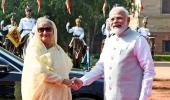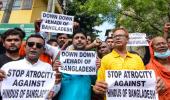'She delivers on promises, especially on security issues which is a core concern for India.'

"India reposes faith in Hasina to address the question of minorities and, in general, uphold a secular fabric in the polity, which is a difficult ask we believe from any non-Awami government. India and Bangladesh have seen a very robust development partnership unfold since 2010," Sreeradha Datta, professor, OP Jindal Global University and non-resident senior fellow, ISAS, National University of Singapore, tells Aditi Phadnis/Business Standard.

The Opposition Bangladesh National Party did not participate in the general elections in Bangladesh. In a seemingly Opposition-less election, who do you see as the primary Opposition?
In the past few days, several Awami League leaders have been mentioning in the public and on social media about the large number of BNP leaders who are contesting the elections. That is not the real situation.
What the government has done very publicly is coerce some BNP leaders, who are in prison (around 10,000 have been arrested in the run-up to the polls), to come out and 'contest the elections, and all will be well'.
Some of these BNP members had little acceptance even within the party, with ongoing cases against them, and some were out of the party much before the elections. They are contesting as independent or shadow candidates.
Four new parties, being dubbed the King's parties, have been recently created, which will also be part of the Opposition. Some of them contested in all 300 constituencies.
These new parties have hardly any political experience and are not known beyond their limited area of influence.
There's also the Jatiyo Party. It agreed to field 280-plus candidates but in 26 specific constituencies, the ruling Awami League stepped away, giving Jatiyo a free run to those constituencies.

So, a friendly contest...
Yes. Like in 2018, when the Awami League won unopposed in a humongous number of constituencies, this time too, it will get the numbers and will make these polls look like a proper election.
The Awami League has found a way to create the illusion of a multiparty election. To prove the point, it is inviting international observers and monitoring bodies and many have obliged.
The fact that it has got Awami League candidates to retire from the poll in favour of candidates from smaller parties suggests that it was very sure it is going to win.
So, some seats will be given to independents and along with these smaller parties, they will pool together to form an Opposition alliance.
It will look and appear to be a free and fair election with the largest party having won, and the others forming a legitimate Opposition in parliament.
What about Dhaka's geopolitical situation vis à vis India, the US and China, which is pouring money into Bangladesh?
For New Delhi, Sheikh Hasina is a reliable partner as she delivers on promises, especially on security issues which is a core concern for India.
India reposes faith in Hasina to address the question of minorities and, in general, uphold a secular fabric in the polity, which is a difficult ask we believe from any non-Awami government.
India and Bangladesh have seen a very robust development partnership unfold since 2010.

Of late, there is no talk in New Delhi about illegal migrants, "termites"...
In the recent official dialogue with Bangladesh, there was no reference to illegal migrants. This used to be a big issue earlier. But in the past 10 years, such conversations have not found any place in bilateral exchanges.
About the US, I have a different point of view. The impression is that it is backing the BNP. I don't agree with that.
While I argue that Bangladesh as a sovereign independent nation would decide what it wants to do, it is evident that there is no one to point out the human rights violations and dilution of democratic norms taking place in Bangladesh.
When democracy is on the downslide in Bangladesh, no one has spoken up except the US. The US has worked with both the Awami League and BNP closely and will continue to do so in the days ahead.
But it appears to be serious about sanctions it has threatened to impose in the face of non-democratic electoral processes.
The security forces, especially the Rapid Action Battalion, are known for their excesses. With the clamping down of the media, not just through the Digital Security Act, the government has been very sharp on any view it disagrees with.
The executive overreach over all the other organs of government is very evident, for instance, a chief justice was forced to step down as he did not concede to a government request.
There are several more such instances of governmental influence on what should have been an independent.
The US has announced sanctions against anyone who is 'complicit' in undermining democratic electoral processes.
Sheikh Hasina's response in parliament was rather strong, saying the US visa was not important for Bangladeshis and this was the US attempt to remove her. But the reality is a bit more complicated.
The strong economic engagement apart, several factors make the Dhaka-Washington ties crucial.
China is an important player in Bangladesh. It has had good relations with every political spectrum in Bangladesh and in recent times, has strongly supported Sheikh Hasina.
Russia has come to defend Bangladesh in face of American criticism. If you examine the larger global developments, it is not difficult to understand the political compulsions on either side.

What are the economic management challenges before the new government?
Bangladesh's economy is in dire straits. In the last quarter of FY23, the trade deficit amounted to $17.15 billion, and the current account deficit amounted to $3.3 billion.
From a peak of nearly $48 billion in 2021, the forex reserve has been following a secular declining trend for nearly two years now and hit $26.9 billion, according to Bangladesh Bank official records, in September 2023.
Its popular ready-made garments (industry is losing global market share. The worker agitation demanding higher wages and better working conditions has not been successful yet.
The participation of women in this sector has dropped from 84 per cent to 74 per cent.
The Covid pandemic and the Russia-Ukraine war have certainly impacted adversely, but the fiscal management and high levels of corruption have led to deep economic crises.
The spike in food inflation to over 12 per cent has made life miserable for the common people.
Bangladesh has already received IMF assistance of over $4.7 billion and will likely go to multilateral organisations/ banks seeking further support.
It has been pointed out that while Bangladesh did see amazing growth, what it was hiding was that its financial infrastructure was always a problem.
At the core is domestic economic and fiscal mismanagement. That is the biggest challenge the new government will have to manage. But for now, all are only focused on managing the political challenges.
Feature Presentation: Ashish Narsale/Rediff.com











